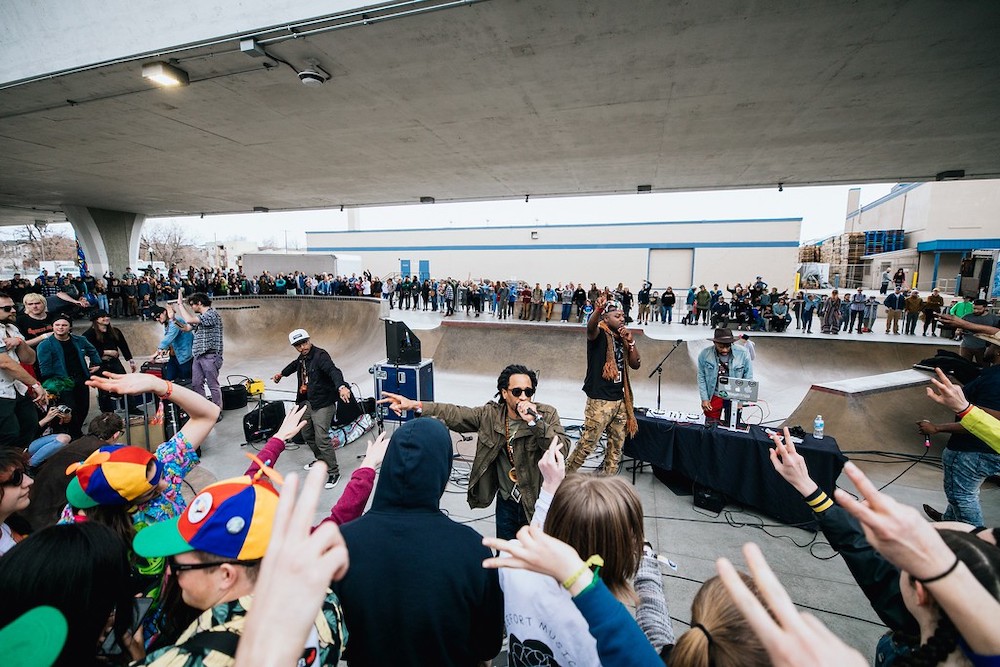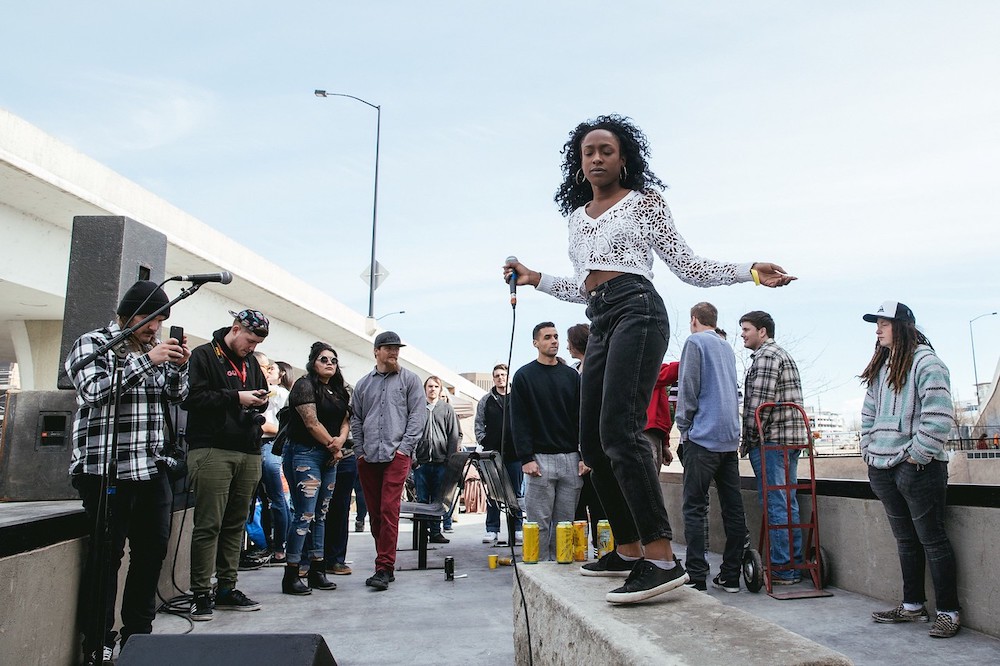Eric Gilbert and Marissa Lovell, the co-founder and publicist of Boise, Idaho’s Treefort Music Festival, exude a tone of jovial near-delirium as they recount the calamitous leadup to their festival’s postponement. Their voices are tinged with the kind of anxiety that the sleepless nights and frayed nerves intrinsic to attempting to totally reconfigure and reschedule a sprawling urban music festival that takes seven-to-eight months to plan in just a week.
It’s the second week of March and although Idaho has yet to record a confirmed case of COVID-19, the pair have just postponed their festival until September, a mere two weeks before it was slated to begin. This drastic decision to enter the uncharted territory of postponement comes on the heels of an announcement less than a week earlier that festivities would be proceeding as planned. Adding to the group’s high anxiety is that Treefort, which has no corporate sponsors, would be so financially decimated by widespread refund requests it would most likely spell the end of the festival.
“We were several weeks in front of this decision,” Gilbert says. “… but the conundrum we found ourselves in was that the government was not ready to commit to any clear direction on what events like ours should or shouldn’t do. However, the more we got behind the science and conferred with colleagues it became clear to us that we needed to act and that we were going to have to take the lead on the decision.” fluid and harried one that’s indicative of the utter chaos that has engulfed the live music industry as a result of COVID-19.
After weeks of mixed messaging from the White House and with no definitive decree about large public gatherings in place, Treefort announced on March 6 that it would be holding its festival the last weekend of the month as planned in an attempt to reassure artists and fans. By March 11, however, after taking stock of the growing pandemic and consulting with health officials and music industry colleagues around the country, Treefort arrived at the realization that postponement until the last weekend of September was the safest option. The decision meant the Treefort team had just a week to reschedule a festival that takes place in a bustling downtown district, has over 500 artists performing in multiple venues and features all manner of non-music attractions.
The task of reconfiguring the logistics of 900 events that take place over five days in over 50 venues — in a week — is Herculean at best and impossible at worst. Treefort enjoys a uniquely symbiotic relationship with its city and citizens, who view the festival as the city’s finest cultural ambassador. That harmonious relationship and attentiveness by the team to what Gilbert termed the “tsunami on the horizon” imbued both he and his team with enough hope to try and salvage the festival.
Gilbert points to the fact that SXSW canceled its festival at essentially the same moment as Treefort’s “stay the course” announcement on March 6 as an example of the anarchy his team found themselves enveloped by. In lieu of any semblance of a clear directive from any level of government, the group found themselves needing to reassure the Treefort community’s mounting concerns with some sort of statement, despite the chaotic fluidity of the situation brought forth largely by the mixed messaging coming out of Washington, D.C. Without a clear government mandate, each festival was essentially left to make imperative decisions about public well-being on their own. “There’s this idea of ‘Hold strong until they shut us down,’ but we didn’t want to cancel the week of,” Lovell says of the tumultuous time. “We were really watching Big Ears [festival in Tennessee] to see what they were going to do, for instance. It’s a weird space to be in where you just have to go with your gut because the government isn’t going to clearly tell us.”

In nine years, Treefort has grown from a funky little festival for upcoming musical acts that resembled a huge block party into an all-encompassing, city-wide celebration of art, food and drink which attracts artists from around the globe that’s been written up in Newsweek, VICE and Rolling Stone, the event simply couldn’t have withstood a large number of refund demands. As such, Gilbert was faced with either seeing his life’s work obliterated or rolling the dice and hoping his team, the city and the artists he’d booked came through.
Gilbert and Lovell say a small percentage of artists and local businesses who weren’t as informed in early March were imploring Treefort to stay the course and not cancel, compounding the already enormous difficulty of the decision before the team. At that point if one had only gleaned their knowledge of the pandemic from the circus-like and misinformation filled daily White House press briefings, they could have been forgiven for thinking, “we have contained this” and “it’s pretty close to airtight” as Larry Kudlow, the director of the National Economic Council told CNBC on Feb. 26, the same day President Trump told the nation, “We’re going to be pretty soon at only five people” and “we could be at just one or two people over the next short period of time” at a press conference.
Comparative to other parts of the country, Idaho has been, thus far, spared widespread decimation by the virus, with 1,917 confirmed cases and 58 deaths as of press time. However, since the first known case of COVID-19 in the state was reported on March 13 — two days after Treefort’s postponement announcement and testing was implemented — there has been a large uptick in confirmed cases with a concentration in Ada County where Boise resides. On April 15, Idaho Gov. Brad Little extended until the end of the month his stay-home directive, which was originally issued on March 25th — two weeks after Treefort’s announcement and the day the festival was due to begin.

Treefort is fond of proclaiming it is “people-powered,” and envision themselves as an extension of the burgeoning Boise music, art, food and drink scenes — which are far more robust than an outsider might guess — as well as an extension of the city itself. That symbiotic relationship with its community has aided the festival greatly during these times most trying via extremely limited refund requests, ensuring the beloved festival’s continued existence. Treefort, in turn, recently launched a live music relief fund for local artists, musicians, engineers, techs, tour managers, production managers and others in the Treasure Valley live music industry who’ve been economically devastated in the wake of COVID-19.
Beyond the limited number of refunds, a small number of its 500+ artists opted out, and those who did only did so out of prior obligation. Out were Japanese Breakfast, Ata Kak, Algiers, AJJ, Grouplove, The Districts, Xiu Xiu, Con Brio and Vanishing Twin; but Treefort has already replaced them with Andy Shauf, Pinback, Chubby & the Gang, Drug Church, Angel Du$t and Becca Mancari, with more to be added.
“It was definitely a little nerve-wracking knowing we couldn’t sustain a large amount of refunds,” Gilbert says. “At first I wondered if rearranging so many differing facets was even possible, but the spirit around the effort it took to essentially postpone our festival nearly 90% intact, in just over a week’s time, was definitely experienced as one of surprising ease because of how fast everyone mobilized to help.”
Treefort may need to tap into that community mobilization again in the coming months. The myriad unknowns about COVID-19 and the patchwork manner in which the country is going to slowly reopen threaten to further postpone events. But after making it through that hellacious week in mid-March, Gilbert is confident his team and his city can roll with the punches.
“Like most in the music industry right now, we are treading water on the Fall and holding out hope for some positive progress,” he says. “We’re staying open-minded to how we may need to approach the festival during that time frame and are prepared to make adjustments to meet the moment, including the possibility of another postponement.”
Dryden explains that the festival’s importance in the community helped spur the overwhelmingly helpful response from Treefort’s team and Boise’s citizenry alike. “Treefort gave the scene a focal point, a platform for showcasing Boise’s talent, providing opportunities and supporting artists, and now we have more than a music scene—we have a music ecosystem,” he says. “New bands are popping up everywhere, we have homegrown indie labels, people are moving here to be a part of it… and Treefort deserves much of the credit.”
Indeed, if there’s a larger lesson to be gathered from Treefort’s adroit handling of these deeply complex coronavirus-inspired calamities it is one of the importance of unyielding communal bonds during these dark days. Be it that of the music industry or that of artistic and nightlife communities of Boise, with each passing day it becomes clearer that it is the strength of our communities that we must lean on in order to persevere, especially in the face of the continuous disinformation being propagated from 1600 Pennsylvania Ave.
“Treefort was built from the ground up, led by a relatively small team, but built by a large community of helping hands that care about it and have contributed their own pieces to it over the years,” Gilbert says. “The strength of the fabric of being a community-grounded festival like ours have seemed all that more apparent the last few weeks.”





